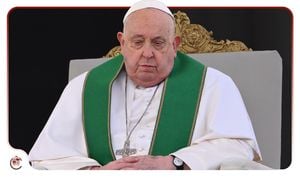John Oliver, the acclaimed host of HBO's "Last Week Tonight," has undoubtedly made his mark on American comedy with his unique blend of political satire and deep dives on serious issues. Now in its 12th season, the show has garnered Oliver 21 Emmy awards, solidifying his status as one of today's sharpest comedians.
Born and raised in Birmingham, England, Oliver showcased his comedic talents early on as the class clown. Encouraged by his parents—his father worked as a school principal and his mother was a music teacher—he pursued his passion for comedy at Cambridge University. It was during his time at the Edinburgh Festival Fringe, known for being a breeding ground for comedians, where Oliver honed his craft. "I want you to know I've befouled this stage so many times before," he humorously reflected on his early gigs, where, he once performed to only four audience members.
While some might have considered those moments disheartening, Oliver embraced them as learning opportunities. He stated, "Bombing is a key, key part of stand-up. You learn more from failure than you do from success." This perspective would shape his comedy career, leading him to take risks on stage, focusing on topics he passionately cared about, particularly politics.
Oliver's fascination with political humor and commentary blossomed after he moved to the United States. A devoted fan of "The Daily Show," he submitted some of his work and scored his big break, becoming part of Jon Stewart's team. "It was really fun to sit behind the steering wheel and think, 'Oh, how fast does this thing go?" he recalled, reflecting on the fast-paced world of late-night television.
His ability to seamlessly mix rigorous research with comedy became the hallmark of "Last Week Tonight." Each episode explores significant societal and political issues, providing deep insights wrapped in humor. "We want it to be right, and for self-preservation purposes. We don’t wanna be sued to oblivion," he joked, highlighting the extensive preparation by his team of 83 staff members, which includes former journalists among comedy writers.
From hospice care to organ donations, Oliver is known for addressing difficult topics with humor. "I know those don’t sound funny, but sometimes I think comedy is the best, most illuminating way to talk about them," he explained. His candor about America's systemic issues resonates with his audience, who appreciates his biting wit aimed at both sides of the political spectrum.
Even when tackling controversial subjects, like Supreme Court Justice Clarence Thomas's failure to disclose gifts, Oliver doesn't shy away from the absurdities. He once sardonicly offered to provide Thomas with $1 million annually if he resigned, saying, "That should be a crime. The very fact it isn’t is a problem." Such bold statements are emblematic of Oliver's fearless approach to comedy.
Yet, for all his success, Oliver has faced criticism for his perspectives on his adopted homeland. He contends, "I think you can criticize something because you love it. Because you love it and you want it to get it back on track." This belief fuels his work and reflects his enduring commitment to using comedy not just for laughs, but as social commentary.
At the heart of Oliver's act is the joy he finds on stage, whether he's revisiting his stand-up roots or passionately discussing current events. "It’s incredibly hard, not infrequently stressful, but it’s really, really fun," he reflected, committed to drawing attention to America's issues through laughter. His comedic style, underpinned by sincerity and research, keeps audiences compelled and informed, promising his continued relevance as both entertainer and commentator.



